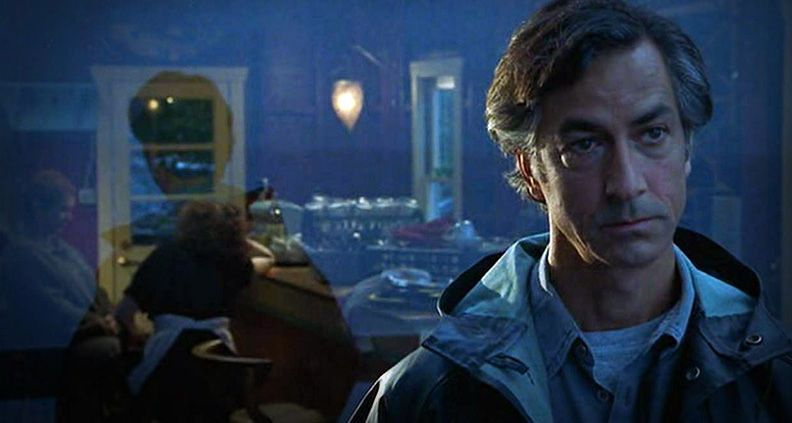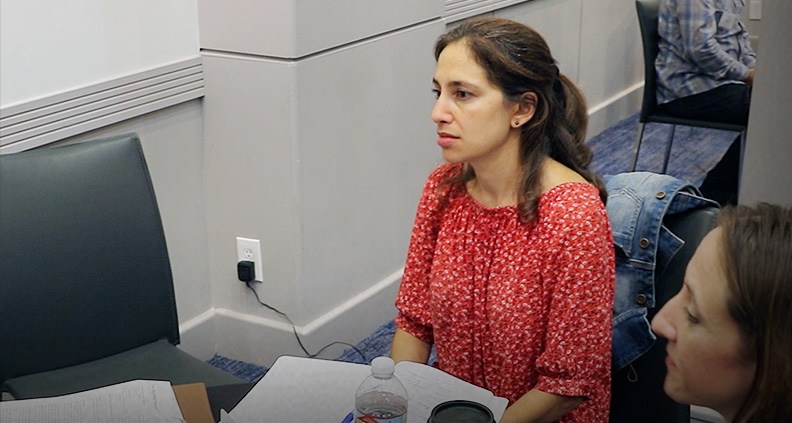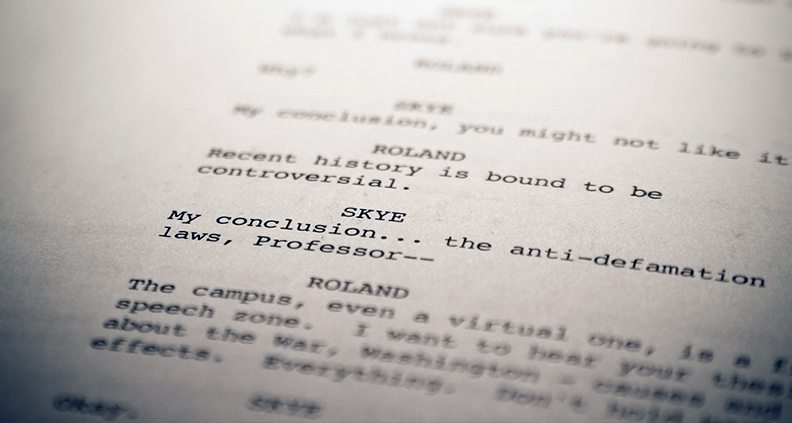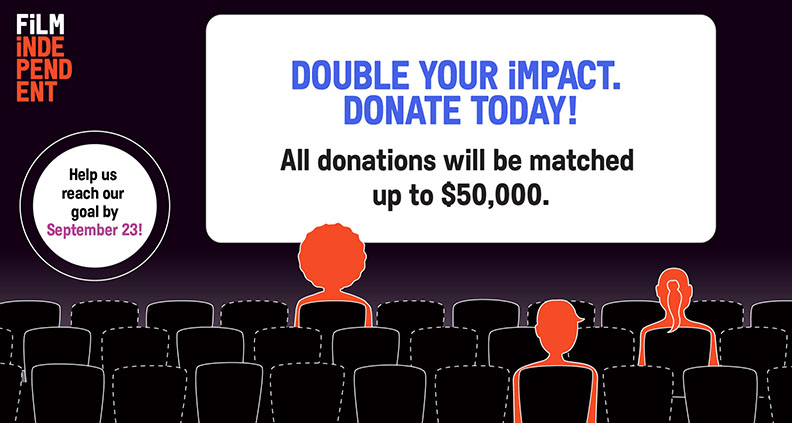Screenwriting Lab Deadlines Are Coming Up. Here’s Why You Should Apply.
If you didn’t know, the General Deadline for writers to submit to our 2021 Film Independent Screenwriting Lab is next week, Wednesday, September 1. The extended deadline for Film Independent Members is September 15.
To highlight the experiences of our Lab participants and myriad benefits of the program, we asked 2018 Fellow Jenny Halper to tell us about her time in the Lab.
I can’t remember a time that my worldview wasn’t filtered through the films I loved–from my obsession, as a four-year-old, with The Wizard Of Oz, to my obsession, as a nine-year-old, with A League of Their Own, to the time I got grounded at the age of 10, for renting Thelma and Louise. When I was a teenager I would go to the Angelica and see movies my classmates hadn’t heard of–The Myth of Fingerprints and Limbo made a particular impression–stories about complicated people where the plots revolved around characters, not the other way around. As a graduate student I was told by an agent that no one wanted to make “indies about human emotion” and I wondered what, then, did he think movies were about?
I could go on about the films that made me want to write, some better known than others–from Jurassic Park to Terms of Endearment to The Ballad of Jack and Rose to Tootsie to When a Man Loves a Woman to A Time to Kill to You Can Count on Me to the previously mentioned Limbo, a movie that savagely shifts from drama to survival story and combines immense scale–the vast and gorgeous landscape of Alaska–with fraught interpersonal intimacies. It’s about colonization, consumerism, parent-child friction; it’s at times bitterly funny and heartbreakingly stark, it has powerful music and equally powerful moments of silence. I saw it in high school, and it made me think about the layers that a movie needs to have. There’s a density to great storytelling that’s invisible at first. Great films should be watched more than once, talked about, dissected.

What the Film Independent Screenwriting Lab does–and what makes it so valuable–is that it places this love of stories front and center. It’s also about the business… but not at first. I started my five weeks in LA this spring meeting six incredibly talented writers whose work reminded me of the power of a distinct point-of-view. Some had directed features, others had worked as DPs, journalists. They were from Egypt, Camaroon, Mexico, the UK, California, Colorado. They were writing stories about frontier women and juvenile delinquents, peasant revolts and eye-opening road trips, a young Egyptian woman searching for her sister and a Mennonite transported to a city. Their stories were wildly different and unfailingly distinctive, proof that the scale and scope of an indie film stretches wide.
We were guided by mentors including Ruth Atkinson, who can spend hours delving into story in a way that is detailed and whole heartedly inquisitive, and Ellen Shanman, whose humor, brilliant critiques and insight into being a working writer was invaluable. In a full circle moment, I realized the first company I interned at had optioned one of her novels.
With Ruth and Ellen, we spent time actually writing. We generated ideas, dialogue, road maps through the tricky middles of our stories. In addition to matching writers with mentors with uncanny insight, Angela Lee and Dea Vasquez–who also ran the Producing Lab I was lucky enough to be a part of–created a space for participants to really trust one another. This was evident from our very first meeting at Escape Room in Downtown LA, where we failed–by a narrow margin–to detonate a bomb hidden in a mannequin behind a wall of maps and cryptic clues.

I’ve worked for the last eight years as a development executive and there are times when I read as many as twelve scripts a week. The problem is not that scripts are bad, but that so much of what comes across my desk seems ground through a factory. Maybe the writing is good, but the story isn’t fresh. Maybe the premise is good, but the characters are completely in service of plot.
I applied for the Screenwriting Lab, in large part, because I was struggling to get back to the kernel of why I loved writing and loved film. Maybe it was fatigue, and the fact that my usual trick (dipping into the script for a movie I love when I reached the point of never wanting to look at another screenplay) was starting to wear thin. I have a tendency to take on more than I can realistically do, and that was starting to take a toll, too.
I was also struggling with the adaptation of an Alice Hoffman novel I’d wanted to turn into a film for years. The story was set in a small Massachusetts town in the mid ’80s that turns against the family of a young girl who contracts AIDS from a blood transfusion. I had a draft and couldn’t find the center of it, I knew it was a story I desperately wanted to tell but was having trouble articulating why I loved it, and why the perspective of the young girl’s brother was the absolutely necessary point-of-view.

After a few weeks of guidance from Ellen, Ruth, and Jeff Stockwell, the gifted writer of films including The Dangerous Lives of Alter Boys and Bridge to Terebithia, who gave some of the most generous and incisive feedback I’ve ever received, I knew what the center of the story was. I was able to put into words the unspoken motivation of a child confronted with an impossible situation. I was also able to understand a theme that threads through most of what I write, or try to write–looking for hope and even beauty in the toughest situation. Maybe that’s too earnest, but it’s what’s important to me–dark stories that don’t necessarily end badly but are also truthful. Stories about imperfect people, with moral questions that are examined if not necessarily resolved.
With much encouragement and inspiration from my fellow writers, and a frequent caffeine boost from Film Independent’s coffee machine (a cartoon coffee bean dances while brewing an amazing variety of cappuccinos and mocha lattes of questionable quality), I was able to get the draft to a place that finally felt right. I was also able to meet Rodrigo Garcia, writer and director of another of my favorite films, Nine Lives, and ask him how he laid bare–without exposition–an entire relationship between characters played by Jason Isaac and Robin Wright in one 15-minute walk through a supermarket. I learned it sometimes takes him years to write scripts, too.
In my experience, the middle stage of writing is the hardest part. The excitement of starting–all that endless potential–is winding to an end. A draft seems hopeless, an array of puzzle pieces that don’t fit together. Through the Lab, and through the remarkable work and insight of my peers and mentors, I was able to navigate the uncertain middle of my process–and be reminded that storytelling isn’t always a clear path, even with the most accomplished writer.
If you’d like to apply to be a part of the 2021 Film Independent Screenwriting Lab, guess what? There’s still time! The General Deadline is September 1, and the Extended Deadline for Members is September 15.
Film Independent Artist Development promotes unique independent voices, providing a wide variety of resources to help filmmakers create and advance new work.
If you are in a position to support our efforts, please make a donation. Your impact will double, dollar-for-dollar, with the generosity of our long-standing Arts Circle Member Susan Murdy. All donations made to Film Independent before September 23 will be matched up to $50,000.
